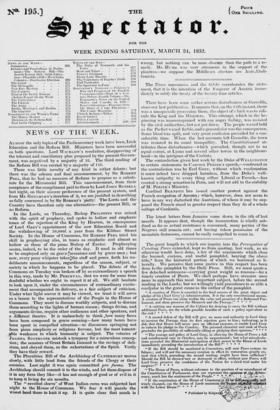NEWS OF THE WEEK.
ALMOST the only topics of the Parliamentary week have been, Irish Education and the Reform Bill. Ministers have been successful on both questions. Lord WICKLOW'S resolution, disapproving of the tolerant and conciliatory plan proposed by the present Govern- ment, was negatived by a majority of 35. The third reading of the Reform Bill was carried by a majority of 116.
There was little novelty of any kind in either debate; but there was the solemn and final announcement, by Sir ROBERT PEEL, that he bad no measure of Reform to propose as a substi- tute for the Ministerial Bill. This announcement, from their acceptance of the compliment paid to them by Lord JOHN RUSSELL last night, on their sincere preference of the present system, and from Mr. GOULBURN'S iteration of it, we are justified in describing as fully concurred in by Sir RoUEni's party7 The Lords andT the Country have therefore only one alternative—the present Bill, or no Reform.
In the Lords, on Thursday, Bishop Pumporrs was seized with the spirit of prophecy, and spoke in hollow and emphatic tones of the rejection of the King by Heaven, in consequence of Lord GREY'S appointment of the new Education Board and the withdrawing of 30,000/. a year from the Kildare Street Society. In the House of Commons, Sir ROBERT PEEL tried his skill in prophesying also, in tones as emphatic and almost as hollow as those of the pious Bishop of Exeter. Prophesying seems, indeed, to be the order of the day. It used in old times to be employed only on grave [occasions and by grave men ; but now, every puny whipster takes;the staff and pours. forth his nn- deliberate announcements, regardless of the season, subject, or society in which he happens to be placed. The debate of the Commons on Tuesday was broken off by so extraordinary a speech in this way, made by Mr. PERCEVAL, that we were for some time doubtful whether we ought to report it at all. We still hesitate to look upon it, under the circumstances of extraordinary excite- ment that accompanied its delivery, as a fair subject of criticism.
U nder what light soever it may be viewed, we trust it will serve as a:lesson to the representatives of the People in the House of Commons. They meet to discuss worldly subjects, and to discuss them according to the lights of human reason; things divine, and arguments divine, require other audiences and other speakers, and a different theatre. It is melancholy to think ,how many faces have been composed in grave seeming—how many hours have been spent in compelled attention—to discourses springing not from pious simplicity or religious fervour, but the most lament- 4ble weakness to which humanity is Subject. The votaries of JOANNA SOUTHCOTE mistook a tympany for a miraculous concep- tion; the senators of Great Britain listened to the ravings of deli- rium, and obeyed them, as the exhortations of the Spirit. Verily they have their reward.
The Pluralities Bill of the Archbishop of CANTERBURY moves slowly, with little laud from the friends of the Clergy or their .enemies. Last night it was again committed pro forma. The Archbishop should commit it to the winds, and let them dispose of it in any form they like—it has not enough of good or of evil in it to keep it living for six months.
The "ravelled sleeve" of West Indian cares was subjected last night to the House of Commons. We fear it will puzzle the wisest head there to knit it up. It is quite clear that much is wrong, but nothing can be more obscure than the path to a re- medy. Mr. HUME was very strenuous in the support of the planters—we suppose the Middlesex electors are Anti-Aboli- tionists.


























